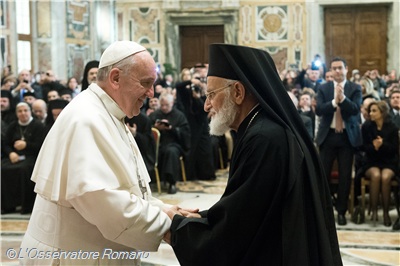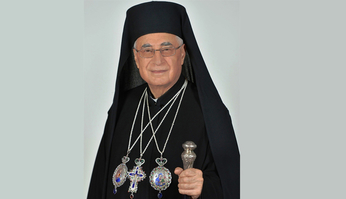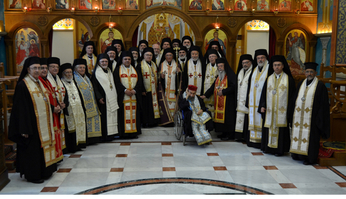Patriarch Youssef
Address of H.B. Patriarch Gregorios III To H.H. Pope Francis
Melkite Greek Catholic Patriarchate
Of Antioch and All the East
Of Alexandria and of Jerusalem
Rabweh 30 November 2013 Press Release
Pope Francis: We cannot resign ourselves to a Middle East without Christians. The Church needs the heritage of the Christian East.
Gregorios III: We bring filial greetings from a Church proud to be in full communion with the See of Peter, a Church which is today a Church in need and for which Pope Francis is a Simon of Cyrene

His Beatitude Gregorios III, Patriarch of Antioch and All the East, of Alexandria and of Jerusalem, accompanied by some 15 bishops, members of the Holy Synod of the Melkite Greek Catholic Church and nearly 500 lay pilgrims, cam on Saturday 30 November, to bring to the Holy Father, Pope Francis, the “filial and devoted greeting“ of a Church which is “proud to be in full communion with the See of Peter and with Your Holiness. We have been most faithful to this communion despite persecutions which made us for decades a Church of the catacombs.”
The Patriarch presented his Holy Synod to Pope Francis before a private audience characterised by frankness, simplicity, brotherliness and communion. The Holy Father and His Beatitude Gregorios III then rejoined the pilgrims in the Clementine Hall.
The faithful represented the Melkite Greek Catholic Church in its entirety. Many came from Lebanon, Syria, Jordan, Palestine including Jerusalem and Galilee, Egypt, the United States, Venezuela, Canada, and Australia, members of the Patriarchal Order of the Holy Cross of Jerusalem from North Italy and Sardinia … The Lebanese delegation included Member of Parliament and former minister, Mr Michel Pharaon, the Lebanese Minister for Telecommunications, Mr Nicolas Sehnawi, and the Attorney General to the Court of Audit, Mr Fawzi Khamis. The Syrian delegation also included a Member of Parliament, Ms Maria Saadeh and Mr Riad Sarji, President of the Saint Vincent of Paul Society in Damascus and its representative for Muslim-Christian dialogue.
After having greeted the Holy Father, Gregorios III presented the Church emphasising its “three distinguishing features: a Church in full communion with the Church of Rome, faithful to our Eastern tradition, on very good terms with our sister Orthodox Church in the Patriarchates of Antioch, Alexandria and Jerusalem; an Arab Church through its origins and roots” and lastly “a Church in a predominantly Muslim society.”
“Our Church,” Gregorios III continued, “is a Church of communion and witness; which has a very special responsibility to that world, which is ours. That is where we have been living our Christianity for nearly two thousand years, of which 1,434 [Islamic] years with Islam...”
“That Church which you love is today a Church in need,” the Patriarch said to the Holy Father before adding, “Now when this Church is in a situation unique in its history, you are a Simon of Cyrene, bearing its cross with it out of compassion and friendship. For this Eastern Church, especially in Syria, you are like Christ when he calmed the storm on the lake of Tiberias.
“Like Blessed Pope John Paul II, who brought down the Berlin Wall through his prayer and bold interventions, you wrought a miracle, Holy Father, by summoning Christians and the whole world to fast and pray on 7 September last. So you brought about a turning point in the Syrian crisis and even in the vision of global politics. The world changed after 7 September, 2013!”
“We assure you that, despite the woes and the quite tragic situation that we have been experiencing for nearly three years now, we want to stay and help our faithful to stay. You called upon us not to allow the flame of hope to be extinguished in our hearts. … We are resolved to be martyrs in this land, blood martyrs, like some of our faithful, including three men from Ma’alula: Michael Taalab, Antonios Taalab and Sarkis Zakhem.
“Most Holy Father, they are real martyrs, who were ordered to recant and proudly refused. Three others, however, gave in and were obliged to profess Islam, but later returned to their ancestral faith.”
Gregorios III ended his address to the Holy Father by saying, “We Christians and Muslims can, want and ought to remain together to witness to the Gospel and build together as Christians and Muslims a better society and future for our young generations.
“We want to stay in the Middle East in response to the call of Jesus, who continually repeats to us (as you continually remind us): “Fear not, little flock,” (Luke 12: 32) because we have a big mission to fulfil for the big flock. “Fear not,” Christ tells us, because “I am with you always, even unto the end of the world.” (Matthew 28: 20) Yes, we want to stay and be, as Jesus asked us to be, light, salt and leaven. (Matthew 5: 13-14)”
Pope Francis endorsed our Church’s sufferings and launched an urgent appeal to various leaders “for violence to stop,” in order to make room for dialogue “to find just and lasting solutions to a conflict that has already caused too much harm.” He also called for greater awareness of how to live together as Christians and Muslims and for the “preservation of religious freedom.” Adding that we cannot “resign ourselves to a Middle East without Christians” he hailed the special role of the Melkite Greek Catholic Church in Muslim-Christian dialogue.
The Holy Father asked everyone, Patriarch, bishops, priests and lay people “generously to assume their responsibilities in Church and society.” He reminded those comprising the “very large diaspora” that they had to “preserve their spiritual roots, traditions and identity because the Church needed the heritage of the Christian East.”
Solemn vespers at the Greek College of Rome was to be celebrated in the evening ahead of the pontifical Divine Liturgy scheduled for Sunday 1 December at Santa Maria in Cosmedin when His Beatitude Gregorios III would be surrounded by members of the Holy Synod, priests. A large number of delegations attended the Liturgy. The patriarch addressed the congregation, emphasising the following points: the need for a strong and coherent Church; a Church fulfilling the slogan for the Synod of the Middle East, Communion and Witness; the importance of identity and openness, as emphasised by the Holy Father to the young people of Brazil. He urged them to remain and not to emigrate despite the harsh situation, especially in Syria. He also told them the story of the three martyrs of Ma’alula and invited them to be ready, for any challenges to our Christian faith and life – and be light, salt and leaven in their communities.
After the Liturgy, an agape was offered to all present by the rector of the Basilica of Santa Maria in Cosmedin, Archimandrite Mtanios Haddad, representative of the Patriarch to the Holy See.
Below is appended the complete Address of H.B. Gregorios III to the Holy Father Pope Francis.
COMPLETE TEXT
Address of H.B. Patriarch Gregorios III
To H.H. Pope Francis
30 November 2013
Most Holy Father
“Ubi caritas et amor, ibi Deus est; congregavit nos in unum Christi amor.”
That is the antiphon that echoes Jesus’ promise: “For where two or three are gathered together in my name, there am I in the midst of them.” (Matthew 18: 20)
It is also the beautiful title attributed to the Church of Rome by Saint Ignatius of Antioch: the “Church that presides in love.”
That was all realised in splendid fashion right from the first moment of your Pontificate. “Deus caritas est,” said Saint John the Theologian and Evangelist. (1 John 4: 8) It can also be said of Your Holiness, “Franciscus caritas est.” In Great Vespers for the Feast of the Metastasis of Saint John the Theologian we find these very beautiful phrases: “O amazing wonder, and work of great wisdom! For he, being filled with love, also became filled with theology!”
In this Doxasticon or hymn of praise I see an eloquent but accurate expression of Your Holiness’ Petrine ministry: you are full of love, and therefore a great theologian!
For our Patriarchal Church of Antioch it is a very great joy to greet Your Holiness today. We bring you the filial and devoted greeting of our priests, monks, nuns, deacons and lay-people, men and women committed alongside their pastors to various forms of apostolate and service to the poor, to universities, schools, hospitals, orphanages, confraternities, youth groups...
Our Church is proud to be in full communion with the See of Peter and with Your Holiness. We have been most faithful to this communion, which cost us a certain period in the situation of a Church of the catacombs.
Our Church has three distinguishing features:
1) We are a Church in full communion with the Church of Rome, faithful to our Eastern tradition, on very good terms with our sister Orthodox Church in the Patriarchates of Antioch, Alexandria and Jerusalem.
2) We are an Arab Church through our origins and roots.
3) We are a Church in a predominantly Muslim society.
That is why I was driven to adopt terminology that some thought daring, though it was merely misunderstood. We are the Church of the Arabs (besides being an Arab Church) and a Church of Islam, namely, a Church whose past, present and future are bound up with Islam: an Arab Church, with and for Arabs; a Church of Islam, with and for Islam. As a Church in the Middle East, we therefore have a very special responsibility to that world, which is ours. That is where we have been living our Christianity for nearly two thousand years, of which 1,434 [Islamic] years with Islam. Our Church is that defined by the Synod for the Middle East and in the Post-Synodal Apostolic Exhortation Ecclesia in Medio Oriente, of your dear predecessor, His Holiness Benedict XVI, on the theme: “Communion and witness.”
Our Church is spread over all countries of the Middle East and in varying proportions in emigration countries. This is what explains the features I just mentioned.
You have met our emigration Church in Latin America, especially in your country, Argentina. I had the pleasure of visiting you in Buenos Aires on 26 August, 2010. You know and love that Eastern Church, in the wealth of Orientale Lumen, its rites, spirituality, theology and all its traditions.
That Church which you love is today a Church in need. You keep talking about it, and especially about Syria, which you call “beloved,” and where our Antiochian patriarchal headquarters is situated.
Now when this Church is in a situation unique in its history, you are a Simon of Cyrene, bearing its cross with it out of compassion and friendship. For this Eastern Church, especially in Syria, you are like Christ when he calmed the storm on the lake of Tiberias.
Like Blessed Pope John Paul II, who brought down the Berlin Wall through his prayer and bold interventions, you wrought a miracle, Holy Father, by summoning Christians and the whole world to fast and pray on 7 September last. So you brought about a turning point in the Syrian crisis and even in the vision of global politics. The world changed after 7 September, 2013!
We sense that you are preparing initiatives that are going to change the vision of the world, especially in the Middle East, and from that throughout the whole world.
Yes! We expect an initiative aimed at resolving the Israeli-Palestinian conflict and establishing a just, lasting and comprehensive peace in the Middle East, starting from the Holy Land and Jerusalem, that City of Peace which in our mother. You are going to bring down the wall which unfortunately separates not only Jews and Palestinians, but also Arab countries from one another and which threatens Muslim-Christian dialogue and living together, and human values.
Solving that conflict, which has lasted for 65 years, means solving fifty per cent of the Middle East’s problems and guaranteeing the Christian presence, a very significant presence for communion and witness.
Most Holy Father
Many of our faithful have left the Middle East. Many more want to leave. We are expending every possible effort to help them stay. The Church is working very hard to ensure a minimum of humanitarian aid. We thank Your Holiness, the Congregation for the Oriental Churches and the various agencies who are helping us to do this.
We assure you that, despite the woes and the quite tragic situation that we have been experiencing for nearly three years now, we want to stay and help our faithful to stay.
You called upon us not to allow the flame of hope to be extinguished in our hearts. Helped and sustained by your prayers, your concern and your prophetic, bold and evangelical initiatives, we wish to stay in this blessed land, cradle of Christianity. We are resolved to be martyrs in this land, blood martyrs, like some of our faithful, including three men from Ma’alula: Michael Taalab, Antonios Taalab and Sarkis Zakhem.
Most Holy Father, they are real martyrs, who were ordered to recant and proudly refused. Three others, however, gave in and were obliged to profess Islam, but later returned to their ancestral faith.
Most Holy Father
Help us to stay in the Middle East: ex Oriente lux!
Recently, I launched a threefold slogan in pledge-form, for our Melkite Greek Catholic Church, and I should like to repeat it to Your Holiness, in my name and in the name of our whole Church:
1) We Christians and Muslims should stay together, in order to witness to the Gospel and as Christians and Muslims together build a new world and better future for our rising generations.
2) We Christians and Muslims can stay together, to be Gospel witnesses and as Christians and Muslims together build a better society and future for our young people.
3) We Christians and Muslims want to stay together, to be witnesses to the Gospel and as Christians and Muslims together build a better world and future for our young generations.
Most Holy Father
We want to stay in the Middle East in response to the call of Jesus, who continually repeats to us (as you continually remind us): “Fear not, little flock,” (Luke 12: 32) because we have a big mission to fulfil for the big flock. “Fear not,” Christ tells us, because “I am with you always, even unto the end of the world.” (Matthew 28: 20)
Yes, we want to stay and be, as Jesus asked us to be, light, salt and leaven. (Matthew 5: 13-14)
We assure you of our prayers, and we ask for yours, and for your blessing.
We love you, Pope Francis!
+ Gregorios III
Patriarch of Antioch and All the East
Of Alexandria and of Jerusalem
For the Melkite Greek Catholic Church

